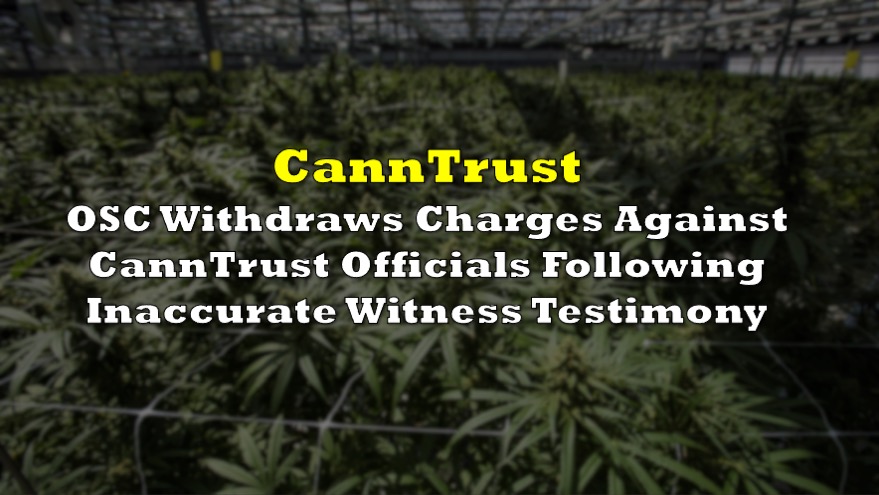Canada’s tax collection agency is taking action to retrieve outstanding excise duty payments from licensed cannabis producers by ordering the garnishment of their revenue.
As reported by MJBizDaily, the escalation in the Canada Revenue Agency’s (CRA) enforcement efforts comes amidst a concerning trend of mounting financial challenges within the federally regulated cannabis industry. According to recent findings, the amount of unpaid federal excise tax owed by Canadian cannabis companies surged to nearly $200 million by March 31, 2023 – a staggering threefold increase compared to the previous fiscal year.
To address this issue, the CRA is intensifying its efforts, including measures such as garnishment, liens on property, and legal actions against delinquent companies. One notable step involves the provincially owned cannabis wholesalers, who are now directed to garnish wholesale payments originally intended for licensed producers and redirect those funds to the federal government.
This directive from the CRA carries significant implications for cannabis businesses, potentially hindering their ability to collect revenue from wholesalers after completing sales.
“It’s a pretty unprecedented step and in a lot of ways speaks to how pervasive the issue is,” Rami Chalabi, an attorney with Toronto law firm McCarthy Tetrault, said in an interview. “Moving directly to garnishment of payments is a significant step to take and will definitely put a lot of people on notice that you can’t continue being delinquent on your [tax] payments.”
While the CRA has not disclosed the exact number of licensed producers affected or the total amount involved, several provincial wholesalers have confirmed receiving orders to garnish payments due to unpaid taxes. Agencies such as the Ontario Cannabis Store, BC Liquor Distribution Branch, and Société québécoise du cannabis have acknowledged their legal obligation to comply with the CRA’s directives.
The enforcement actions underscore the growing concern over the financial health of cannabis companies in Canada, with many struggling to meet their federal tax obligations amidst competing financial priorities.
Meanwhile, companies compliant with their tax obligations view the CRA’s crackdown favorably, arguing that it levels the playing field by holding tax-delinquent businesses accountable.
The excise tax is a Sin Tax, akin to alcohol & tobacco taxes.
— Jodie Giesz-Ramsay (@JodieEmery) February 28, 2024
Alcohol & tobacco hurt & kill people and have enormous costs to society.
Cannabis is NOT the same. It doesn’t harm or cost society the way alcohol & tobacco do.
And cannabis is medicine!
There should be no Sin Tax! https://t.co/IKzDtoB1V9
More revenue from cannabis tax
This development comes following a report that the federal government raked in more revenue from cannabis excise tax than it did from beer and wine combined last fiscal year. According to data from the country’s Public Accounts, in the 2022-23 fiscal year ending March 31, the government received $610.1 million from beer excise duties, while wine contributed $277.6 million, bringing the combined total to $887.7 million.
In contrast, excise duties from cannabis amounted to approximately $894.6 million, with $667.6 million being transferred to provincial and territorial governments, leaving about $227.1 million for the federal government.
This marks a significant increase in the federal government’s share of excise revenue from cannabis in recent years: $18.4 million in 2018-2019, $52 million in 2019-2020, $108.9 million in 2020-2021, and $160.22 million in 2021-2022.
However, the cannabis industry has criticized the taxation formula, deeming it disproportionate and unfair. The House of Commons Standing Committee on Finance, in its pre-budget report for 2024, made 359 recommendations, one of which proposed adjusting the excise-duty formula for cannabis. The committee suggests implementing a 10% ad valorem rate, equating to 10% of the transaction’s value, instead of the current system that imposes a flat rate of $1 per gram or 10% of the gram’s value, whichever is greater.
While the federal government is not obligated to accept these recommendations, industry leaders like David Klein, CEO of Canopy Growth Corp., are hopeful for swift implementation.
“We encourage the Federal government to rapidly implement these recommendations which will meaningfully improve the financial health of the industry and remain committed to working collaboratively to support the long-term sustainability of the cannabis industry in Canada,” he said.
Information for this briefing was found via MJBizDaily and the sources mentioned. The author has no securities or affiliations related to this organization. Not a recommendation to buy or sell. Always do additional research and consult a professional before purchasing a security. The author holds no licenses.









